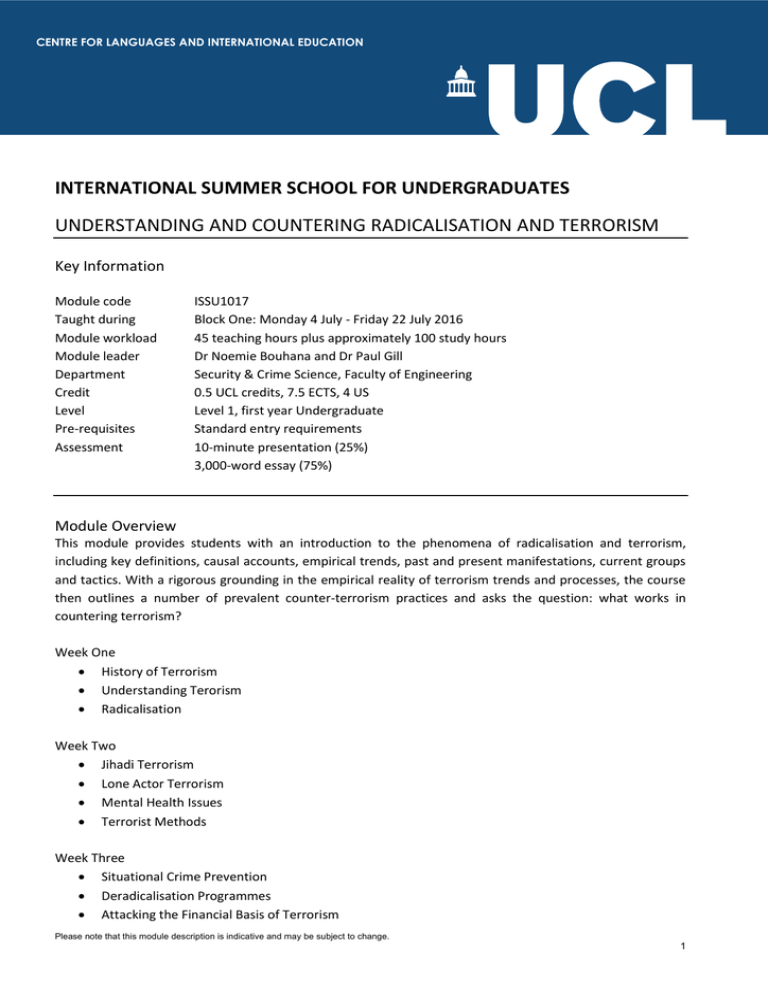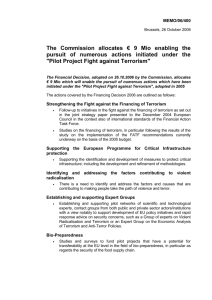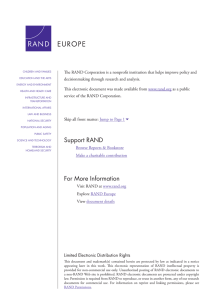INTERNATIONAL SUMMER SCHOOL FOR UNDERGRADUATES UNDERSTANDING AND COUNTERING RADICALISATION AND TERRORISM
advertisement

CENTRE FOR LANGUAGES AND INTERNATIONAL EDUCATION INTERNATIONAL SUMMER SCHOOL FOR UNDERGRADUATES UNDERSTANDING AND COUNTERING RADICALISATION AND TERRORISM Key Information Module code Taught during Module workload Module leader Department Credit Level Pre-requisites Assessment ISSU1017 Block One: Monday 4 July - Friday 22 July 2016 45 teaching hours plus approximately 100 study hours Dr Noemie Bouhana and Dr Paul Gill Security & Crime Science, Faculty of Engineering 0.5 UCL credits, 7.5 ECTS, 4 US Level 1, first year Undergraduate Standard entry requirements 10-minute presentation (25%) 3,000-word essay (75%) Module Overview This module provides students with an introduction to the phenomena of radicalisation and terrorism, including key definitions, causal accounts, empirical trends, past and present manifestations, current groups and tactics. With a rigorous grounding in the empirical reality of terrorism trends and processes, the course then outlines a number of prevalent counter-terrorism practices and asks the question: what works in countering terrorism? Week One History of Terrorism Understanding Terorism Radicalisation Week Two Jihadi Terrorism Lone Actor Terrorism Mental Health Issues Terrorist Methods Week Three Situational Crime Prevention Deradicalisation Programmes Attacking the Financial Basis of Terrorism Please note that this module description is indicative and may be subject to change. 1 Module Aims Through successive case studies, students will familiarise themselves with five approaches to prevention and disruption: 1) Efforts to anticipate and prevent terrorism acts through situational measures; 2) enforcement measures used to disrupt, disable or suppress the activities of terrorist networks; 3) interventions aimed at the individual actor, their risk factors, belief systems and pathways out of terrorism involvement; 4) removal of the economic basis for terrorist activities by attacking organized crime; 5) strategies which focus on the "root causes" of terrorism and radicalisation. Teaching Methods Interactive lectures and seminars, open class and small group discussions, excursions, group work and private study. Reading lists will be available online via the UCL library site. Students will be directed towards class materials, further support and discussion forums on Moodle. Learning Outcomes Upon successful completion of this module, students will: Be able to understand terrorism and radicalisation from a distinctive security and crime science perspective Understand ‘what works’ in preventing and disrupting radicalisation and terrorism Critically reflect on the conceptual and methodological issues involved in studying radicalisation and terrorism as concrete scientific problems Be able to consider what a scientific approach implies for the design and implementation of preventative or disruptive social technologies Assessment Methods 10-minute presentation (25%) 3,000-word essay (75%) Key Texts Horgan, J. (2014). The psychology of terrorism. Routledge. Gill, P. (2015). Lone-Actor Terrorists: A Behavioural Analysis. Routledge. Bouhana, N., & Wikstrom, P. O. (2011). Al Qai'da-Influenced Radicalisation: A Rapid Evidence Assessment Guided by Situational Action Theory. Sageman, M. (2004). Understanding terror networks. University of Pennsylvania Press. Borum, R. (2011).”Radicalization into violent extremism I: A review of social science theories”. Journal of Strategic Security, 4(4), 2. Borum, R. (2011). ”Radicalization into violent extremism II: A review of conceptual models and empirical research.” Journal of Strategic Security, 4(4), 3. Pape, R. A. (2003). “The strategic logic of suicide terrorism.” American political science review, 97(03), 343361. Lum, C., Kennedy, L. W., & Sherley, A. (2006). “Are counter-terrorism strategies effective? The results of the Campbell systematic review on counter-terrorism evaluation research.” Journal of Experimental Criminology, 2(4), 489-516. Freilich, J. D. (2009). Reducing terrorism through situational crime prevention. G. R. Newman (Ed.). Monsey, NY: Criminal Justice Press. Braithwaite, A., & Johnson, S. D. (2012).”Space–time modeling of insurgency and counterinsurgency in Iraq.” Journal of Quantitative Criminology, 28(1), 31-48. Please note that this module description is indicative and may be subject to change. 2





